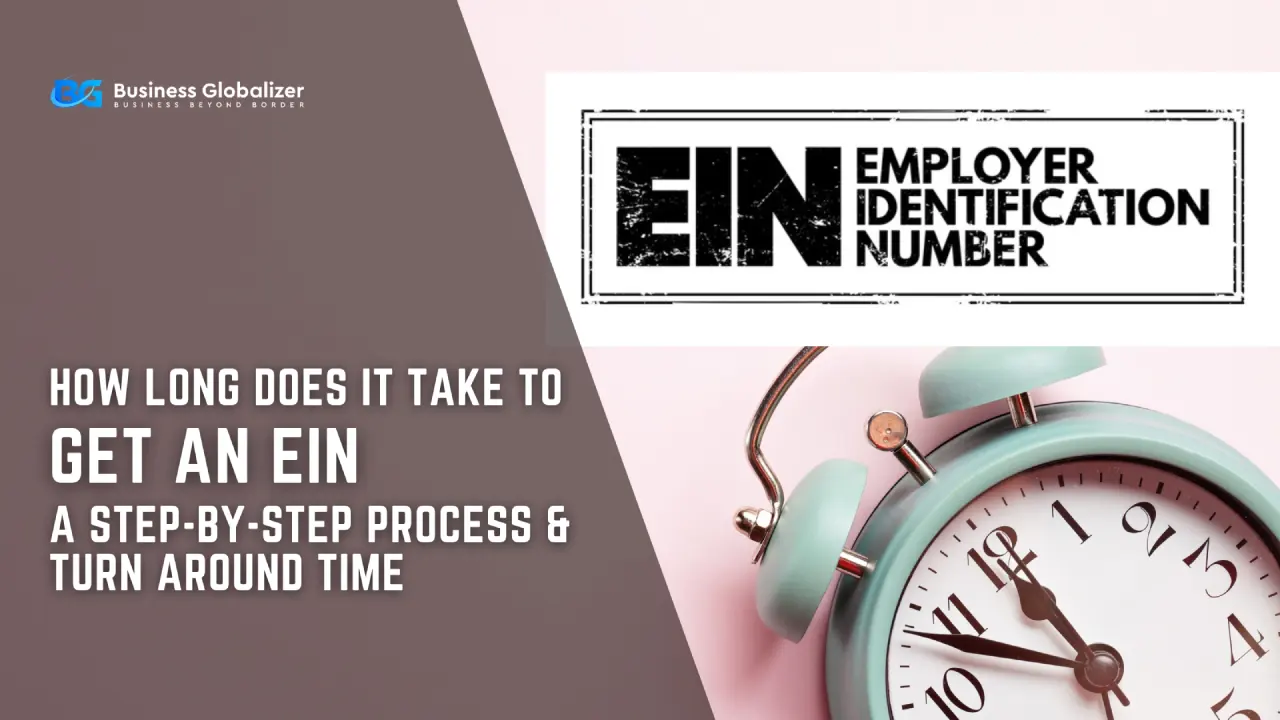Going blind into the world of U.S. identification numbers can be tricky, especially when it comes to the Employer Identification Number (EIN) and the Individual Taxpayer Identification Number (ITIN). Both play crucial roles in American bureaucracy, whether you’re diving into the business world or navigating tax obligations.
An EIN is indispensable for business operations, including hiring employees and managing taxes. On the other hand, the ITIN is a key tool for individuals who need to comply with U.S. tax laws but don’t have a Social Security Number (SSN).
Today, we will shed light on the concept of EIN vs. ITIN to help you determine which one aligns with your needs.
What Is an EIN?
The word ‘EIN” stands for Employer Identification Number. This is a special nine-digit number that businesses and other entities are given by the Internal Revenue Service (IRS).
EINs are necessary for various situations. It can be compared to your company’s social security number. Just as individuals use their social security numbers for various purposes, such as opening bank accounts or filing taxes, businesses use their EINs for
- Hiring employees.
- Opening business bank accounts.
- Filing tax returns.
- IRS Reporting.
- Separating business and personal finances.
- Complying with IRS withholding laws.
- Specific licensing purposes.
- And operating employee benefit plans like health and retirement plans.
Whether you’re a sole proprietorship, partnership, corporation, or nonprofit organization, obtaining an EIN is important and beneficial.
Example of EIN
In understanding the concept of an EIN, let’s have a look at a practical example:
Let’s meet Harley, an enthusiastic baker who decides to turn her hobby into a business by opening “Sweet Treats Bakery.” To formalize her venture, Harley applies for an EIN from the IRS and receives the unique nine-digit number, 12-4365789.
In this example of EIN, Harley’s experience showcases how an EIN streamlines operations and ensures compliance with legal requirements, benefiting businesses of all sizes.
Who Needs an EIN?
Understanding who needs an Employer Identification Number (EIN) is quite important for proper tax management and compliance.
So without any delay, let’s learn which entities need this unique identification number:
- Corporations: Legal entities with separate obligations and debts require an EIN. Changes in structure may necessitate a new EIN.
- Partnerships: Most partnerships need EINs, with exceptions for certain joint ventures. Changes in partnership structure may require a new EIN.
- Limited Liability Companies (LLCs): LLCs with multiple members need EINs, while single-member LLCs may require one for specific purposes.
- Sole Proprietorships: While not always necessary, sole proprietors may opt for an EIN, especially if they have employees or for bankruptcy purposes.
- Non-Residents: To pay taxes, foreign nationals who do business or make investments in the United States must have an EIN.
- Others: Certain types of trusts, estates, personal service corporations, tax-exempt organizations, household employers, bankruptcy estates, and Real Estate Mortgage Investment Conduits (REMICs) require EINs for specific purposes.

Why Do I Need an EIN?
Understanding who needs an EIN leads us to the question: Why do I need an EIN? There are several compelling reasons:
- Legal Requirement: Certain entities, such as corporations, partnerships, and LLCs, are legally obligated to have an EIN. Non-residents must obtain EINs to operate their businesses lawfully in the United States.
- Tax Reporting: An EIN is necessary for filing tax returns, reporting income, and fulfilling other tax-related obligations to the IRS.
- Employee Hiring: If you plan to hire employees, an EIN is essential for reporting payroll taxes and complying with employment laws.
- Business Banking: Whether you are a resident or non-resident, most banks require an EIN to open a business bank account for specific business activities.
- IRS Communication: An EIN facilitates communication with the IRS for matters like audits, inquiries, and other correspondence.
- Business Identity: Having an EIN establishes your business as a separate legal entity, which can enhance credibility and professionalism.
- Contracts and Agreements: Many partnerships and contracts require each party to have an EIN. Having an EIN can facilitate these partnerships and contractual agreements by providing a standardized identifier for each entity involved.
- Business Growth: As your business expands, an EIN streamlines processes like obtaining financing, applying for licenses, and entering into partnerships.
Regardless of your residency status or business structure, the “Purpose of EIN” is to serve as a key identifier for reporting income, filing taxes, and conducting business transactions within the United States.
How Do I Apply for an EIN?
Now that we understand why an EIN is crucial for businesses, you may wonder how to obtain one.
The application process for EIN is straightforward. You can easily apply for an EIN through the IRS website online. If you prefer not to apply online, you can apply by submitting Form SS-4 via mail or fax to the IRS. However, this method takes longer, and you’ll typically receive your EIN within a few weeks.
Non-U.S. residents can apply by phone or fax through the IRS’s International Taxpayer Service. Also, if you are a non-resident you can appoint a legal company formation agent like Business Globalizer to get your EIN.
What Is an ITIN?
Now, let’s move to the “ITIN.” ITIN is the abbreviation for “Individual Taxpayer Identification Number.” The Internal Revenue Service (IRS) issues a unique nine-digit identifier to individuals who are required to have a U.S. taxpayer identification number but are ineligible to obtain an SSN.
Non-resident aliens, resident aliens, and certain dependents or spouses of U.S. citizens or resident aliens who are not eligible for an SSN can apply for an ITIN—through a W-7 Form. ITINs enable individuals to comply with U.S. tax laws, file tax returns, and claim certain tax benefits.
Note: An ITIN is for tax purposes only and does not confer the right to work in the United States or qualify the individual for Social Security benefits.
Example of ITIN
To understand what an ITIN is, let’s consider an example of its application.
Suppose Maria, a non-resident alien, has been living and working in the United States for several years. Despite her contributions to the workforce and tax system, Maria is not eligible for a Social Security Number (SSN) due to her immigration status.
However, Maria still needs to fulfill her tax obligations in the U.S., including filing tax returns and reporting income. To do so, she applies for an ITIN through the IRS and receives the unique nine-digit number, 9XX-XX-XXXX.
With her ITIN, Maria can now accurately report her income, claim tax credits, and comply with U.S. tax laws. Despite not having an SSN, Maria can navigate the tax system effectively and ensure compliance with legal requirements.
Who Needs an ITIN?
Understanding who needs an ITIN is a must-learn for navigating the U.S. tax system effectively. ITINs are necessary for:
- Non-Resident Aliens: Individuals who are not U.S. citizens or permanent residents but have U.S. tax obligations.
- Resident Aliens: Some resident aliens may also need an ITIN.
- Dependents or Spouses: Certain dependents or spouses of U.S. citizens or resident aliens who are ineligible for an SSN.

Why Do I Need an ITIN?
Understanding why you need an ITIN is unignorable for being compliant with the U.S. tax system, especially for those not eligible for an SSN. Here’s why an ITIN is important:
- Tax Compliance: Just like U.S. citizens and residents who use Social Security Numbers (SSNs) for tax purposes, individuals who are not eligible for an SSN but have U.S. tax obligations need an ITIN to comply with IRS requirements. This includes filing tax returns, reporting income earned in the U.S., and claiming tax benefits.
- Legal Requirements: Some legal transactions and obligations in the U.S. may require individuals to have an ITIN. For example, opening a bank account, applying for a mortgage, or receiving certain government benefits may necessitate having an ITIN as a taxpayer identification number.
- Access to Financial Services: Having an ITIN allows individuals to access financial services in the U.S., such as banking, credit, and loans. Many financial institutions require a taxpayer identification number for account opening and transactions.
- Claiming Tax Benefits: Certain tax benefits, such as the Child Tax Credit, the Earned Income Tax Credit, and the American Opportunity Tax Credit, are available to eligible individuals who have an ITIN. Without an ITIN, individuals may miss out on these valuable tax credits and deductions.
How Do I Apply for an ITIN?
Non-resident aliens, resident aliens, and certain dependents or spouses of U.S. citizens or resident aliens who are not eligible for a Social Security Number (SSN) can apply for an ITIN.
The process of getting an Individual Taxpayer Identification Number (ITIN) involves applying to the Internal Revenue Service (IRS).
To apply for an ITIN, eligible individuals must complete IRS Form W-7, Application for IRS Individual Taxpayer Identification Number. This form can be downloaded from the IRS website or obtained from an IRS office.
Along with the completed form, applicants must provide valid supporting documentation to verify their identity and foreign status. It is important to comply with all requirements. Failure to provide accurate and complete documentation may result in delays or denial of the ITIN application.
For a hassle-free application process, individuals can seek assistance from an IRS-certified acceptance agent like “Business Globalizer.”
Key Differences Between EIN and ITIN
Now that we’ve explored the significance of both an Employer Identification Number (EIN) and an Individual Taxpayer Identification Number (ITIN), let’s learn how these identification numbers differ from each other:
Definition and Purpose
- EIN (Employer Identification Number): Issued by the IRS, an EIN is a nine-digit number that serves as a federal tax identification number for businesses. It’s used to identify a business entity and, among other things, is necessary for tax filing, hiring employees, opening business bank accounts, and applying for business licenses.
- ITIN (Individual TaxpayerIdentification Number): Also issued by the IRS, an ITIN is a tax processing number for individuals who are required to have a U.S. taxpayer identification number but do not have, and are ineligible to obtain, a Social Security Number (SSN). ITINs are used primarily for tax purposes to enable individuals, including nonresident aliens, to comply with U.S. tax laws.
Eligibility
- EIN: Businesses needing to file tax returns, hire employees, open business bank accounts, or handle other financial matters requiring an identification number must obtain an EIN. This includes sole proprietors, partnerships, corporations, non-profits, and LLCs.
- ITIN: Individuals who are not eligible for an SSN but need to file or report taxes in the U.S. are eligible for an ITIN. This includes non-resident aliens, their spouses, and dependents who need to file a federal tax return.
Application Process
- EIN: The application for an EIN can be completed online via the IRS website, by fax, mail, or by phone for international applicants. The process is free and can often be completed in one sitting, with the number issued immediately when applying online.
- ITIN: To apply for an ITIN, individuals must complete Form W-7 and submit it to the IRS, along with a federal tax return and proof of identity, which can include a passport or other national identification document. This process may take several weeks to complete.
Usage
- EIN: Beyond tax filing, an EIN is used for business banking, credit applications under the business name, payroll, and employee tax purposes, and applying for business licenses.
- ITIN: An ITIN allows individuals to comply with U.S. tax laws, open a U.S. bank account, and potentially qualify for a tax refund. It does not provide work authorization or qualify an individual for Social Security benefits.
Validity and Renewal
- EIN: Once assigned, an EIN is valid indefinitely and does not require renewal. However, if the business structure or ownership changes, a new EIN may be needed.
- ITIN: ITINs must be renewed if not used on a federal tax return at least once in the last three consecutive years. Additionally, the IRS periodically updates ITINs to enhance security.
Overall, while both EINs and ITINs serve important roles in the U.S. tax system, they cater to different entities and individuals with distinct purposes. Understanding the differences between EIN and ITIN is quite important for ensuring compliance with tax laws and regulatory requirements, whether you’re a business entity or an individual taxpayer.
Comparison Table for EIN vs. ITIN
Here’s a table summarizing EIN vs. ITIN for your better understanding:
| Aspect | EIN | ITIN |
| Definition and Purpose | A nine-digit federal tax identification number that is primarily used by businesses and entities for tax reporting, hiring employees, opening business bank accounts, and conducting financial transactions. | A tax processing number for individuals who have U.S. tax obligations but are not eligible for a Social Security Number (SSN), enabling them to comply with tax laws, file tax returns, and claim tax benefits. |
| Eligibility | Businesses and entities operating in the United States, including corporations, partnerships, LLCs, trusts, and estates. | Non-resident aliens, resident aliens, or certain dependents or spouses of U.S. citizens or resident aliens who need a U.S. taxpayer identification number but are not qualified for an SSN. |
| Application Process | Apply directly to the IRS either online, by mail, fax, or phone. | Complete Form W-7 and submit it to the IRS along with original or certified copies of documents to verify identity and foreign status. |
| Usage | Opening business bank accounts. Applying for business licenses. Filing business tax returns. Payroll and employee tax duties. | Filing U.S. tax returns. Opening a U.S. bank account (for some banks). Proving legal residency when applying for a driver’s license (in some states). |
| Validity and Renewal | Valid indefinitely and does not require renewal. May need a new EIN if the business structure or owner changes. | Must be renewed if not used on a tax return for three consecutive years. The IRS may also require renewal for security enhancements. |
FAQs on EIN vs. ITIN
Q1. How do I apply for an EIN?
Answer: You can apply for an EIN online at the IRS website or by sending the IRS Form SS-4 by fax or mail.
Q2. Can I use my EIN as an ITIN?
Answer: No, EINs are for businesses, while ITINs are for individuals without a Social Security Number (SSN).
Q3. Do I need both an EIN and an ITIN?
Answer: It depends on your situation; businesses typically need an EIN, while individuals with U.S. tax obligations but no SSN require an ITIN.
Q4. Can I use an ITIN to work in the United States?
Answer: No, ITINs do not provide work authorization; they’re solely for tax purposes.
Q5. Can I have both an EIN and an ITIN?
Answer: Yes, certain situations may require both an EIN and an ITIN, depending on your business structure and personal tax status.
Q6. Can I use my ITIN to claim dependents on my tax return?
Answer: Yes, individuals with ITINs can use them to claim dependents on their tax returns if they meet IRS eligibility requirements.
Q7. Can I use my EIN for personal tax purposes?
Answer: No, EINs are specifically for business-related tax reporting, while ITINs are for individual tax obligations.
Final Thoughts
In conclusion, learning EIN vs. ITIN helps you determine whether you need an EIN or ITIN depending on your specific circumstances. If you’re a business or entity operating in the United States, an EIN is essential for tax reporting and conducting business-related transactions.
On the other hand, if you’re an individual with U.S. tax obligations but not eligible for a Social Security Number, an ITIN enables compliance with tax laws and claiming tax benefits.






